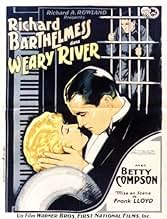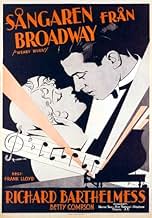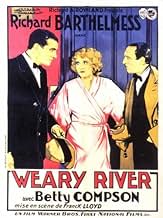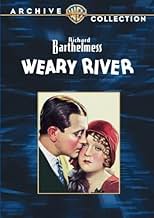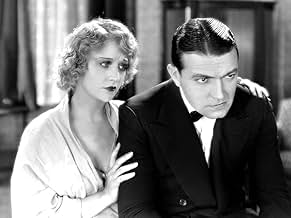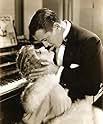Adicionar um enredo no seu idiomaA gangster is put in prison, but finds salvation through music while serving his time. Again on the outside, he finds success elusive and temptations abound.A gangster is put in prison, but finds salvation through music while serving his time. Again on the outside, he finds success elusive and temptations abound.A gangster is put in prison, but finds salvation through music while serving his time. Again on the outside, he finds success elusive and temptations abound.
- Direção
- Roteiristas
- Artistas
- Indicado a 1 Oscar
- 2 vitórias e 1 indicação no total
George E. Stone
- Blackie
- (as George Stone)
Ray Turner
- Elevator Boy
- (as Raymond Turner)
Ernie Adams
- Ex-Con in Alley
- (não creditado)
Brooks Benedict
- Jerry's Guest
- (não creditado)
Ruth Cherrington
- Actress Backstage Who Locks Her Door
- (não creditado)
James Conaty
- Attorney at Trial
- (não creditado)
Richard Cramer
- Prison Radio Announcer
- (não creditado)
Oliver Cross
- Restaurant Patron
- (não creditado)
Edwards Davis
- Prison Chaplain
- (não creditado)
Sally Eilers
- Hatcheck Girl
- (não creditado)
Jim Farley
- Plainclothesman with Sergeant
- (não creditado)
Sherry Hall
- Prison Phone Operator
- (não creditado)
Chuck Hamilton
- Prison Photographer
- (não creditado)
Avaliações em destaque
Weary River (1929), restored by UCLA and TCM, is a great chance to see two silent screen stars Richard Barthelmess and Betty Compson step into the talkie era together, warming your heart as they do so. Their characters are so obviously head over heels crazy about one another that you can't help but be endeared to them and their story.
Sure, we've seen prison films like this before, but there is still such a sweetness to this one because of the caliber of stars involved. Other silent stars like the first William Holden, who was a character actor of the era, and Gladden James, who got his start in silents in the 1910's, show up too and we get to hear their voices for the first time. Part silent - part talkie makes for an odd mix in most of these early sound films, but the very nice Vitaphone soundtrack helps to smooth over any rough spots.
I really loved the picture but then I'm very sentimental about these particular stars so please bear with me while I give this wonderful relic a 10 out of 10.
And my guess is that Richard Barthelmess is NOT singing here. The lip synching is off, and besides it doesn't sound like his voice at all. I wonder who the real singer was?
I've since researched the film on the TCM website and found the singer dubbing for Mr. Barthelmess was Johnny Murray.
Sure, we've seen prison films like this before, but there is still such a sweetness to this one because of the caliber of stars involved. Other silent stars like the first William Holden, who was a character actor of the era, and Gladden James, who got his start in silents in the 1910's, show up too and we get to hear their voices for the first time. Part silent - part talkie makes for an odd mix in most of these early sound films, but the very nice Vitaphone soundtrack helps to smooth over any rough spots.
I really loved the picture but then I'm very sentimental about these particular stars so please bear with me while I give this wonderful relic a 10 out of 10.
And my guess is that Richard Barthelmess is NOT singing here. The lip synching is off, and besides it doesn't sound like his voice at all. I wonder who the real singer was?
I've since researched the film on the TCM website and found the singer dubbing for Mr. Barthelmess was Johnny Murray.
Turner Classic Movies presented "Weary River" in March of 2003 as part of its month of Oscar. I found it intriguing, even enjoyable. Partly because it was half-silent and half-sound, I was intrigued, since I have a deep and abiding interest in the earliest films. I enjoyed it for that reason, and because the story itself was, at the very least, pleasant, if not totally believable and realistic. Betty Compson, who played Alice, had a remarkably cute way of speaking, and whenever she called to her lover Jerry, played by Richard Barthelmess, she pronounced it "Jer-wy," which I found endearing. Great cinema? Perhaps not, but one I would like to see again, if only to prove to myself whether Barthelmess did his own singing. And to watch and hear the adorable Betty Compson.
Singing gangster Richard Barthelmess (as Jerry Larrabee) is sent "up the river" after an innocent bystander is killed in one of his orchestrated shoot 'em ups. In prison, Mr. Barthelmess (#46039) has more time for singing and less time for racketeering. He becomes a hit in the big house and decides to go straight on the outside. But, after serving his time, Barthelmess receives a rocky reception. While a wonderful singer, he's derided as an ex-con. Through it all, Barthelmess is encouraged by beautiful blonde Betty Compson (as Alice Gray). She and warden William Holden would like Barthelmess to keep trying, but he is tempted by his criminal past...
"Weary River" is a part-talking, part-silent film. It begins as a silent, with oddly primitive background music (for 1929), and turns "talkie" early in the running time. You're thinking it will remain there, but the silent style occasionally returns. Perhaps the soundtrack on these scenes was inferior and re-takes unsatisfactory. While mostly a sound film, the spirit is silent; this may be why the technology appears superior to many other early talkies. The possibly better all-silent version should be restored, if possible...
Then a very big star, Barthelmess maintained his standing during the transition from silent to sound. His voice was fine, but Barthelmess is obviously better in the older style. Barthelmess also mouths his songs for a vocal double. Taken from this film, the song "Weary River" was a big hit for the popular new singer Rudy Vallee. Randolph Scott and Sally Eilers are extras and elevator "boy" Raymond Turner looks frightened. Director Frank Lloyd's artful prison sequences require no dialogue, and photographer Ernie Haller is an obvious asset. Their assistant Alvin Knechtel was killed in a plane crash, sadly, on the verge of a promising career.
***** Weary River (2/10/29) Frank Lloyd ~ Richard Barthelmess, Betty Compson, William Holden, Louis Natheaux
"Weary River" is a part-talking, part-silent film. It begins as a silent, with oddly primitive background music (for 1929), and turns "talkie" early in the running time. You're thinking it will remain there, but the silent style occasionally returns. Perhaps the soundtrack on these scenes was inferior and re-takes unsatisfactory. While mostly a sound film, the spirit is silent; this may be why the technology appears superior to many other early talkies. The possibly better all-silent version should be restored, if possible...
Then a very big star, Barthelmess maintained his standing during the transition from silent to sound. His voice was fine, but Barthelmess is obviously better in the older style. Barthelmess also mouths his songs for a vocal double. Taken from this film, the song "Weary River" was a big hit for the popular new singer Rudy Vallee. Randolph Scott and Sally Eilers are extras and elevator "boy" Raymond Turner looks frightened. Director Frank Lloyd's artful prison sequences require no dialogue, and photographer Ernie Haller is an obvious asset. Their assistant Alvin Knechtel was killed in a plane crash, sadly, on the verge of a promising career.
***** Weary River (2/10/29) Frank Lloyd ~ Richard Barthelmess, Betty Compson, William Holden, Louis Natheaux
Mostly talkie that's part silent (a goat gland), this film boasts solid performances by the stars: Richard Barthelmess and Betty Compson. He's a small-time gangster who gets framed by a rival and goes to prison. She's the moll with a heart of gold who waits for him.
This early talkie also boasts a few songs, including the wonderful title song sung by Barthelmess (but really Johnny Murray). Not just a gangster picture, this one shows how Barthelmess reforms and goes out into the world only to be called CONVICT at every turn. He almost goes bad again but a visit to the old warden (William Holden) sets him straight. Of course the rival gets bumped off anyway.
This film garnered a lot of bad publicity in 1929 because even though Barthlemss (a major star of his time) signed statements that the singing voice is his, rumor had it he was dubbed. It's obvious he's not singing live but whether the voice is actually his, we may never know. Still, Barthelmess gives a solid performance as does the beautiful Betty Compson (check out those close-ups!)as the loyal friend.
WEARY RIVER may be the first early talkie where there was a controversy over possible dubbing. It almost doesn't matter now, but Barthelmess got caught in a lie, stating he did his own singing when the songs were dubbed by Johnny Murray. Watch this one for Richard Barthelmess and Betty Compson--both early Oscar nominees--in solid performance in a very early talkie.
This early talkie also boasts a few songs, including the wonderful title song sung by Barthelmess (but really Johnny Murray). Not just a gangster picture, this one shows how Barthelmess reforms and goes out into the world only to be called CONVICT at every turn. He almost goes bad again but a visit to the old warden (William Holden) sets him straight. Of course the rival gets bumped off anyway.
This film garnered a lot of bad publicity in 1929 because even though Barthlemss (a major star of his time) signed statements that the singing voice is his, rumor had it he was dubbed. It's obvious he's not singing live but whether the voice is actually his, we may never know. Still, Barthelmess gives a solid performance as does the beautiful Betty Compson (check out those close-ups!)as the loyal friend.
WEARY RIVER may be the first early talkie where there was a controversy over possible dubbing. It almost doesn't matter now, but Barthelmess got caught in a lie, stating he did his own singing when the songs were dubbed by Johnny Murray. Watch this one for Richard Barthelmess and Betty Compson--both early Oscar nominees--in solid performance in a very early talkie.
"Weary River" is what you might call a transitional style movie from Warner Brothers/Vitaphone. While it's not truly a full talking picture since much of it is silent and uses intertitles, some of it is sound--a bit of the dialog and the songs. This is exactly what they did previously with "The Jazz Singer" and by 1929, they'd finally be making all sound pictures. So, many of the films from the studio in 1928 would be like this...providing enough sound to please the masses...for now.
Jerry (Richard Barthelmess) is a gangster, though he dresses nice and doesn't look or sound like one. His life of crime eventually catches up to him and he's sent to prison. The warden of the place is an odd one--very progressive for the time and dedicated to fixing the cons who can be fixed. As for Jerry, he's initially dubious but soon finds a niche leading the prison's orchestra and writing music. He's so successful that he eventually becomes a radio sensation and one of his songs is a hit. Soon, he's released from prison. However, there's a strong pull from his old life--and when he finds out who set him up, he's mad enough to kill. What's next? And, how does the old warden enter the picture?
This film suffers a bit here and there because the movie is a tad overly melodramatic. And, the story wraps up too quickly and easily. Still, for the time, it's a very good picture and worth your time.
Jerry (Richard Barthelmess) is a gangster, though he dresses nice and doesn't look or sound like one. His life of crime eventually catches up to him and he's sent to prison. The warden of the place is an odd one--very progressive for the time and dedicated to fixing the cons who can be fixed. As for Jerry, he's initially dubious but soon finds a niche leading the prison's orchestra and writing music. He's so successful that he eventually becomes a radio sensation and one of his songs is a hit. Soon, he's released from prison. However, there's a strong pull from his old life--and when he finds out who set him up, he's mad enough to kill. What's next? And, how does the old warden enter the picture?
This film suffers a bit here and there because the movie is a tad overly melodramatic. And, the story wraps up too quickly and easily. Still, for the time, it's a very good picture and worth your time.
Você sabia?
- CuriosidadesThe film is part silent, with intertitles, and part sound, which was important to feature the main character's talent as a singer, although the title song Weary River was nevertheless dubbed by a professional singer. One scene near the end features an orchestra playing on-screen on set that is a radio studio, while traditional silent movie sound is substituted for real sound. Then the scene technology audibly changes to sound recorded on film, with the same orchestra appearing to play for real (possibly dubbed) as the main character begins to sing (although he is listed as dubbed) in a radio performance that prompts his sweetheart to call the radio studio. The scene is an unusual mix of technologies during a period of transition from silents to sound.
- Erros de gravaçãoWhen Jerry Larrabee is brought in to the prison bathroom, there is already an inmate having a bath, who has disappeared before the scene is over.
- Citações
Prison Warden: Oh, I know how you feel. But, things won't be half as bad if you'll only play ball with us.
- Versões alternativasFirst National also released this film in a silent version.
- Trilhas sonorasWeary River
(1929)
Music by Louis Silvers
Lyrics by Grant Clarke
Sung by Richard Barthelmess (dubbed by Johnny Murray)
Principais escolhas
Faça login para avaliar e ver a lista de recomendações personalizadas
Detalhes
- Data de lançamento
- País de origem
- Idioma
- Também conhecido como
- Weary River
- Locações de filme
- Empresa de produção
- Consulte mais créditos da empresa na IMDbPro
- Tempo de duração1 hora 26 minutos
- Cor
- Proporção
- 1.33 : 1
Contribua para esta página
Sugerir uma alteração ou adicionar conteúdo ausente

